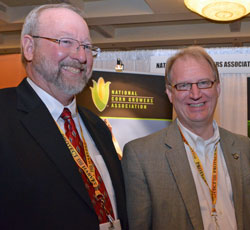 According to the 2016 World Energy Outlook (WEO-2016), the winners to reach energy demand growth through 2040 will be renewables and natural gas. The annual report is published by the International Energy Agency (IEA) and finds that the era of fossil fuels is long from over. Natural gas will continue to expand and coal and oil usage will decrease. This underscores the need for more ambitious climate goals throughout the world finds the study. WEO-2016 finds, however, that government policies along with energy sector cost reductions will enable a doubling of renewables. Other progress can be made, finds the report, through energy efficiency improvements.
According to the 2016 World Energy Outlook (WEO-2016), the winners to reach energy demand growth through 2040 will be renewables and natural gas. The annual report is published by the International Energy Agency (IEA) and finds that the era of fossil fuels is long from over. Natural gas will continue to expand and coal and oil usage will decrease. This underscores the need for more ambitious climate goals throughout the world finds the study. WEO-2016 finds, however, that government policies along with energy sector cost reductions will enable a doubling of renewables. Other progress can be made, finds the report, through energy efficiency improvements.
“We see clear winners for the next 25 years – natural gas but especially wind and solar – replacing the champion of the previous 25 years, coal,” said Dr Fatih Birol, the IEA’s executive director. “But there is no single story about the future of global energy: in practice, government policies will determine where we go from here.”
 As the energy mix around the world continues to transform, WEO-2016 states that there will be risks to energy security – especially related to oil and gas. Global demand for these energy sources will continue to grow through 2040, in part due to lack of easy alternatives to oil in road freight, aviation and petrochemicals, finds the report. Also during this time oil demand from passenger cars will decline even though the number of cars on the road will double over the next 25 years. This will be accomplished through mileage improvements and the use of biofuels and electric vehicles, according to WEO-2016.
As the energy mix around the world continues to transform, WEO-2016 states that there will be risks to energy security – especially related to oil and gas. Global demand for these energy sources will continue to grow through 2040, in part due to lack of easy alternatives to oil in road freight, aviation and petrochemicals, finds the report. Also during this time oil demand from passenger cars will decline even though the number of cars on the road will double over the next 25 years. This will be accomplished through mileage improvements and the use of biofuels and electric vehicles, according to WEO-2016.
A major step forward in curbing climate change is the Paris Agreement that took effect November 4, 2016. However, WEO-2016 calls for more ambitious programs to meet climate goals including limiting the rise of average global temperatures to 2.7°C by 2100. While the path is tough, the report argues climate goals can be achieved if across the board policies to accelerate low carbon technologies and energy efficiency are put in place.
“Renewables make very large strides in coming decades but their gains remain largely confined to electricity generation,” added Dr Birol. “The next frontier for the renewable story is to expand their use in the industrial, building and transportation sectors where enormous potential for growth exists.”














